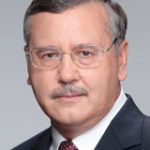
Two elements are important for the success of diplomatic (and other) efforts in finding a solution to the Russia-Ukraine military conflict: the agenda, and format, of the talks with Russia.
On the agenda, if further talks are based on the scope of last year’s ‘Minsk agreements’ of 5th and 19th September, it will be impossible to stop the Russian military intervention and restore peace in Ukraine and Europe at large. The ‘Minsk agreements’ do not address three key objectives which are vital for sustainable peace in Ukraine, the restoration of international law as well as the prevention of any further Russian military aggression, including against EU and/or NATO member-states. The first of those objectives must be the full withdrawal of Russian troops, Russian paramilitary formations, Russian military hardware, and Russian weapons from Ukrainian territory. The two other, equally important objectives are the restoration of Ukraine’s control over its state border in the eastern part of the country and the return of the Crimean peninsula to Ukrainian state sovereignty.
The ‘Minsk agreements’ provide only a temporary, quasi-peaceful solution, prolonging further Russian occupation and control of Ukrainian territory. The military conflict is therefore frozen and can easily re-escalate at any time over the months, years or decades ahead. The package of ‘Minsk agreements’, even if renewed and reinforced, is only anaesthesia, not a treatment of the illness.
Regarding the format of the talks, the ‘Normandy format’ is more suitable than the current Minsk framework. However, it leaves aside important players such as the United States and the United Kingdom, both of whom are signatories to the 1994 Budapest Memorandum, which ensured Ukraine’s sovereignty within the then existing borders. The most suitable and effective set-up would be the ‘Geneva format’, involving Russia, Ukraine, the European Union and the United States. Such a format was used in negotiations in the spring of 2014. Given the scale of conflict and its possible implications for the whole of Europe and beyond, direct engagement by both the US and the EU is vital.
As a means of negotiating a solution to the Ukraine-Russia conflict, the ‘Minsk format’ has been useless from the very beginning. The main reasons are: Russia’s dominant position at the talks; the weakness of the OSCE which is ill-suited for such a mission; and the wholly inappropriate and intolerable direct participation of pro-Russian separatists in negotiations.
The opinions articulated above represent the views of the author(s), and do not necessarily reflect the position of the European Leadership Network or any of its members. The ELN’s aim is to encourage debates that will help develop Europe’s capacity to address the pressing foreign, defence, and security challenges of our time.

